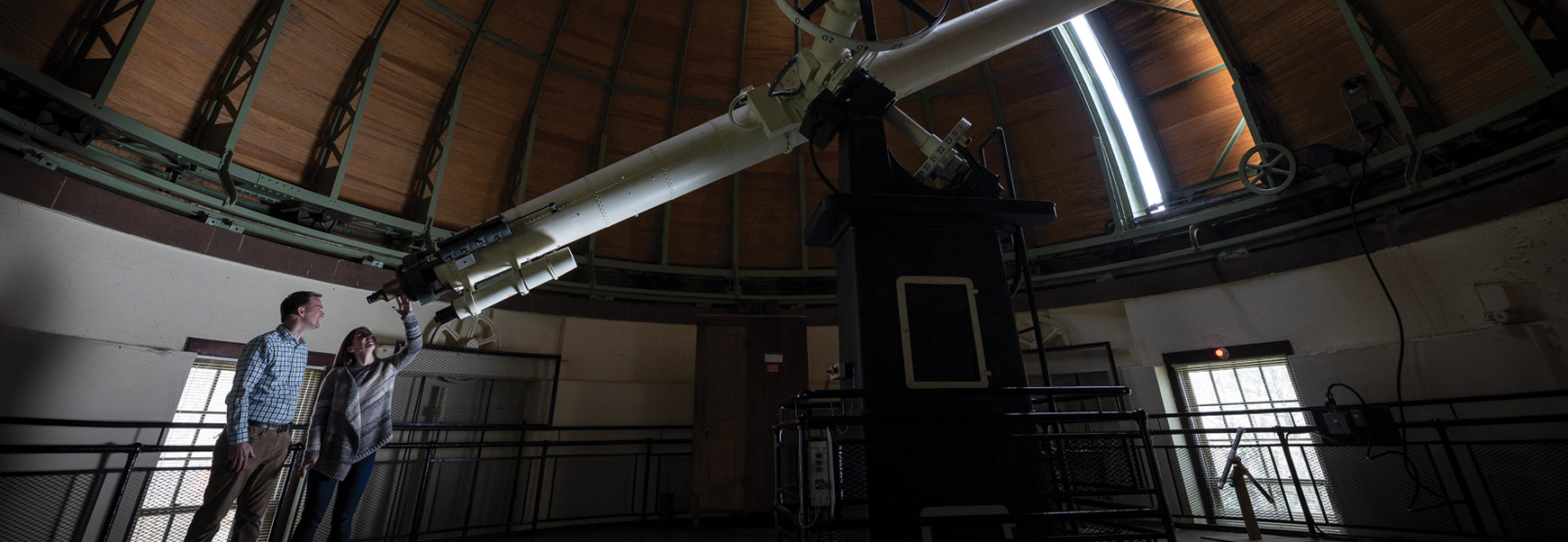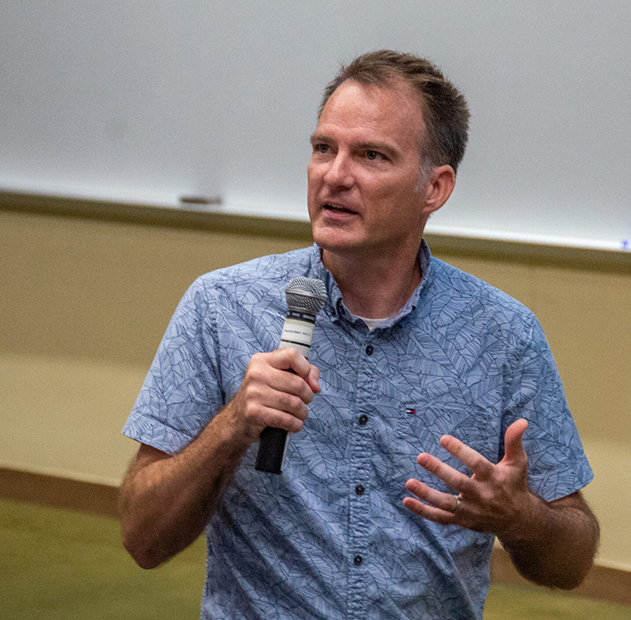
Natural Sciences and Mathematics

Insight into our scientifically and technologically complex culture requires mastery of scientific skills as well as a broader understanding of the world. Take courses that apply the scientific method, utilize quantitative reasoning, and enhance scientific literacy. Prepare to answer difficult questions by applying these skills in other fields, taking advantage of Wesleyan’s experimental approach to explore outside the typical bounds of science education.
Immersive and Expansive
Create your own academic path—expanding your interests, broadening your knowledge, and diving deep in some areas to gain expertise. Our distinct open curriculum approach (supported with general education guidelines, faculty advisors and peer mentors) allows you to align your academic studies with your intellectual curiosity.
Natural Sciences and Mathematics Areas of Study
Explore the natural world and embrace the study of structure.
The Astronomy Department provides outstanding opportunities for undergraduates who wish to major in this fascinating subject, either in preparation for graduate school or as an end in itself. Our unique program blends coursework with research opportunity and provides students access to professional-quality telescopes, instrumentation, and computers. A principal strength is our active research faculty who will work one-on-one with undergraduates employing state-of-the-art instrumentation and computers to investigate areas of current astronomical interest.
The Biology Department offers a broad range of courses that emphasize the process of scientific inquiry and experimentation within the context of extraordinary new advances and insights in today’s natural science fields—from molecular biology, epigenetics, evolution, ecology, genetics/genomics, and neuroscience to bioethics, conservation and public health. Whether foundational to a career in research or medicine or adding intellectual insight and inspiration to students of the humanities, arts, or social sciences, students of all backgrounds are welcome.
Research in the Chemistry Department spans organic and inorganic nanomaterials, new recyclable polymers, the molecular basis of neurodegenerative diseases, understanding the structures and dynamics of proteins, the development of biofuels, the structures of molecules in the interstellar medium, the development of new therapeutic and diagnostic drugs, and computational approaches to complex chemical systems. A familiarity with chemistry is not only fundamental to other sciences, but is relevant to government, art, economics, and archaeology.
The College of Design and Engineering Studies (CoDES) challenges students to think critically and creatively, and to respond responsibly to the broad and complex social, technological, cultural, and environmental conditions that surround them in today’s world. Through a curriculum that brings together iterative creation, experimentation, and critique students engage in making as a form of inquiry and research. Distributed across the campus, CoDES activities are centered around the IDEAS Lab at the Exley Science Center and the Digital Design Studio in the Center for the Arts.
The Earth and Environmental Sciences Department offers an exploration of many aspects of the natural world— from active volcanoes to climate change to eco-conservation. Courses in geology, environmental science, environmental chemistry, ecology, and planetary geology lead to different areas of specialization and career options. Students work closely with faculty on research projects and perform independent research in the field.
The Bailey College of the Environment was created with a belief in the resilience of the human spirit and a desire to develop a long-term vision of ecosystem health. The most important challenge facing current and future generations will be the quality of the environment and the allocation of dwindling natural resources among populations. Students discuss environmental issues from a variety of disciplinary perspectives, understand their connections to social or political issues, and derive well-formulated independent conclusions.
Informatics and Modeling offers students two distinct pathways to develop computational, analytical, and quantitative reasoning skills that are becoming increasingly important in many fields of study: Computational Science and Quantitative World Modeling (CSM), and Integrative Genomic Sciences (IGS).
The College of Integrative Sciences (CIS) aims to equip students with the creative and quantitative skills needed to address current and emerging global challenges in science and technology. The CIS promotes an interdisciplinary and integrative approach to scholarship and learning across mathematics and the life, physical, and behavioral sciences. With a faculty mentor, student researchers pursue inquiry-based learning and develop necessary problem-solving skills. The linked major offered by the CIS combines the intellectual depth of the major with breadth achieved through courses and research in the linked major.
The Department of Mathematics and Computer Science offers undergraduate majors while also participating in the College of Integrative Sciences, the Data Analysis minor, the IDEAS minor, and the Informatics and Modeling minor. Coursework prepares students with strong computational abilities, abstract mathematical reasoning skills, an understanding of how to apply mathematical theories in practice, and the ability to write and speak clearly and elegantly about mathematics. The department's graduate programs include a PhD in mathematics and MA programs in mathematics and computer science.
The Molecular Biology and Biochemistry program focuses on the molecular basis of life — how cells process, integrate and act on information to create and propagate living organisms. Coursework introduces students to technologies in molecular genetics, cell biology, biochemistry, biophysics, genomics, and bioinformatics to investigate the Central Dogma — replication of biological information, regulation of gene expression, and mechanisms of protein function.
Molecular Biophysics provides students with interdisciplinary training at the intersection of molecular biology, chemistry, chemical biology, physical chemistry, and molecular physics. Molecular biophysics is distinguished by an emphasis on analytical, structural and quantitative research investigations of biomolecular and macromolecular systems.
The Neuroscience and Behavior program offers courses and research activities taught by faculty members in the departments of biology, psychology, and chemistry. The discipline of Neuroscience probes one of the last biological frontiers, asking fundamental questions about how the brain and nervous system work in the expression of behavior. Through lecture/seminars, lab-based methods courses, and hands-on research experience, students are afforded a rich educational experience in a field where important and exciting developments and discoveries continue to occur.
The Physics Department fosters student engagement in research and develops proficiency in key areas of physics, including quantum theory, electromagnetism and optics, thermodynamics and statistical mechanics, classical dynamics, and condensed-matter physics. Coursework is designed to develop competency in quantum theory, electromagnetism and optics, thermodynamics and statistical mechanics, classical dynamics, and condensed-matter physics. Preparation in mathematical and computational methods is an integral part of the program. Students may attend weekly colloquium series or research seminars in atomic and molecular physics, chemical physics, condensed-matter physics, and theory. The Society of Physics Students is a great resource for sharing ideas and questions with like-minded students.
The Psychology Department offers scientific study of the human mind, brain, and behavior. Areas of psychology represented in the department include human development, social psychology, cognitive psychology, cultural psychology, neuroscience, and psychopathology. Psychology majors receive broad training across these areas, have opportunities to pursue topics of particular interest in greater detail, and develop skills in research methods and statistics.
Planetary Science exposes students to an emerging interdisciplinary field that seeks to understand the origin and evolution of the solar system in which we live and the other solar systems that we have identified in our galaxy.
This a really favorable system for what I do a lot of, which is transmission spectroscopy, measurements of the absorption from the planetary atmosphere, so I’m really looking forward to the next phase of the project.
”










